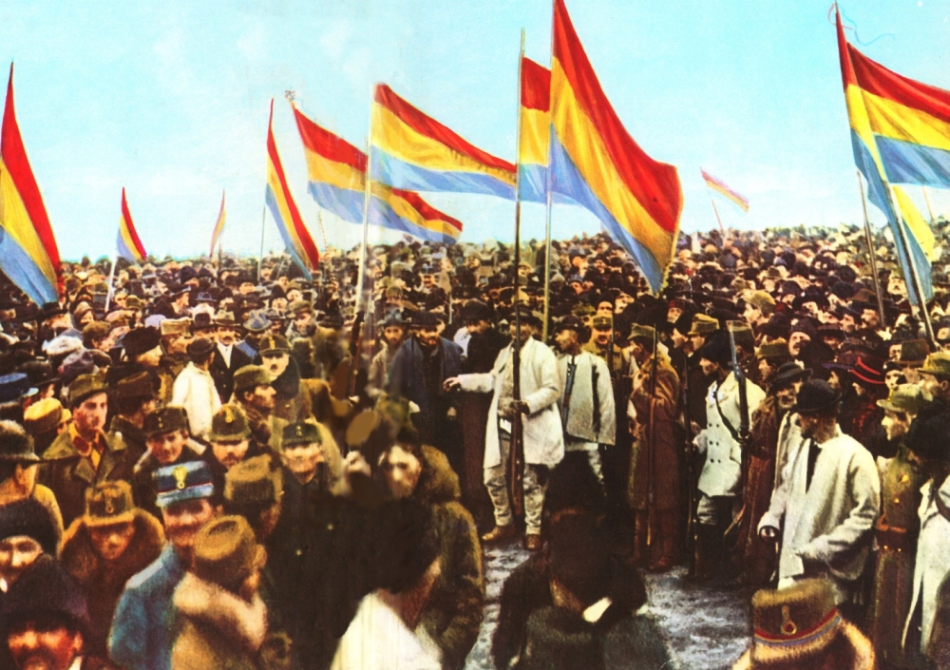December 1st, the National Day of Romania
On December 1st, 1918, Transylvania joined the Kingdom of Romania into what was to be known as Greater Romania.

România Internațional, 01.12.2014, 12:59
On December the 1st, 1918, Transylvania joined the Kingdom of Romania into what was to be known as “Greater Romania.” In a National Assembly meeting held in Alba Iulia, thousands of Romanians endorsed the union. The archive of the Oral History Centre of the Romanian Radio Broadcasting Corporation preserves a highly valuable document, which gives us an indication of the enthusiasm of that year, seen as a new beginning after the war of 1914-1918. It is a recording of the Greek Catholic Bishop Iuliu Hossu reading out the resolutions of the National Assembly. A martyr and a survivor of communist political persecution, Iuliu Hossu was born in 1885 and died in 1970. The recording is of outstanding importance, not only because it preserves the voice of Iuliu Hossu, but also because it summarises the political, economic, social and civic aspirations of the Romanians in the early 20th century. For Bishop Hossu, the religious aspect was the most important contribution to the union:
“Brothers! The time set has fully come, when God Almighty makes known through his faithful people the justice for which we have been thirsty for centuries. Today, through our resolve, Greater Romania is built, the one and undivided. The Romanians in Transylvania can now freely join their motherland, Romania! As the bishop of Cluj-Gherla, I also join them in their happiness. I pray to God that his love and grace be with our people and our country, and that he may keep them from all harm. May this country flourish on justice and truth!”
Iuliu Hossu’s address also had a realistic dimension, related to the aspirations of all those who believed in the founding of Greater Romania:
“The National Assembly of all Romanians in Transylvania, Banat and the Hungarian Country, whose rightful representatives gathered in Alba Iulia on December the 1st, 1918, pronounce the union of those Romanians and of all the lands they inhabit with Romania. In particular, the National Assembly proclaims the nonnegotiable rights of the Romanian nation on the entire country of Banat, stretching between the rivers Mures, Tisza and the Danube. The National Assembly gives all these territories provisional autonomy until the Constituent Assembly has convened, based on universal vote. In this regard, the National Assembly proclaims the following as the fundamental principles in the establishment of the new Romanian state: complete freedom to all nations living within its borders and education, administration and justice for all different nations, in their own language and by their own people. Each nation will be represented in the country’s lawmaking and governing bodies, proportionately with the number of its members. Equal rights and complete autonomy will be guaranteed for all religious denominations within the state. True democracy will be applied to all aspects of public life. All people starting with the age of 21, of both sexes will have the right to direct, equal and secret vote to elect their representatives in villages, counties and Parliament. Absolute freedom of the press, freedom to assemble and freedom of association and expression will be guaranteed. A radical land reform will be launched, to create a record of all property, in particular large pieces of land. We will help farmers acquire their own property, for their families to be able to work. The core principle of this reform will be rooted on the one hand in the idea of social equality, and on the other hand in the goal of improving productivity. Industrial workers will have the same rights and privileges as are laid down in the laws of the most advanced industrial countries of the West.”
Iuliu Hossu’s address also illustrates quite clearly the international dimension of the Romanian union project:
“The National Assembly expresses its wish that the Peace Congress might bring about such concord of the free nations as to ensure justice and freedom for all nations, large or small, and in the future to discard war as a means to settle international relations. The Romanians convened in this National Assembly hail their brothers in Bukovina, who freed themselves from the plight of the Austrian-Hungarian monarchy and joined Romania, their motherland. The National Assembly hails, with love and enthusiasm, the liberation of the peoples so far subject to the Austrian-Hungarian monarchy, namely the Czechoslovakians, Austrians, Germans, Yugoslavians, Poles and Ruthenians, and sends its greetings to all these nations. The National Assembly humbly honours the memory of the brave Romanians who shed their blood for our ideals in this war, who died for the freedom and unity of the Romanian nation. The National Assembly expresses its gratitude and admiration for the allied powers, who fought with determination against an enemy that had prepared for war for many decades and who thus saved civilisation from barbarism.”
Ninety-six years since the union of December the 1st, 1918, the words of Iuliu Hossu not only tell us about a great accomplishment in the past, but also call on the future generations never to give up their fight for freedom.






























